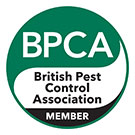GOT PEST PROBLEMS, GET IN TOUCH FOR A FREE QUOTE
- Telephone0141 432 0433
- Emailinfo@allpestservices.co.uk
- REQUEST A CALLBACK
The Common Clothes Moth [Tineola bisselliella] and Case Bearing Clothes Moth [Tinea pellionella] are the principal moth species that damage clothes and carpets in the UK.
Other species like the Brown House Moth [Hofmannophila pseudospretella] and White Shouldered House Moth [Endrosis sarcitrella] are commonly found in houses but are more likely to attack food stuffs than fabrics and are generally regarded as scavengers.
Eggs are laid in batches of 50-200 depending on species hatching usually within 4-10 days. The emerging larvae do the damage, biting through fibres of clothing or carpets or burrowing into foodstuffs.
Larvae may travel considerable distances to seek suitable pupation sites. Adults do not feed.
Do you have a problem with moths? We can help…
All Pest Services is a member of the British Pest Control Association (BPCA) and the National Pest Technician’s Association (NPTA), as well as being an approved member of the Confederation of European Pest Control Associations (CEPA). We are also Safe Contractor Approved.
Our staff have been specifically trained to undertake all types of insect control work and have many years’ experience in the profession. All our staff have achieved the Royal Society for Public Health Level 2 Award in Pest Management which is a requirement for members of the BPCA. All our staff also have specific qualifications in Insect Control and the Safe Use of Pesticides.
Although many pest species can be relatively easily controlled the key is correct identification. Incorrect identification of the pest species or extent of infestation are the most common reasons for failure. For this reason All Pest Services offer a bespoke service for most types of insect control. The first thing is to give us a call to discuss the problem. Some issues can be resolved without the need for treatment. Alternatively we can carry out a site survey to ensure the problem is correctly identified and efficiently dealt with.
All Pest Services is a member of the British Pest Control Association (BPCA) and the National Pest Technician’s Association (NPTA), as well as being an approved member of the Confederation of European Pest Control Associations (CEPA). We are also Safe Contractor Approved.
Our staff have been specifically trained to undertake all types of insect control work and have many years’ experience in the profession. All our staff have achieved the Royal Society for Public Health Level 2 Award in Pest Management which is a requirement for members of the BPCA. All our staff also have specific qualifications in Insect Control and the Safe Use of Pesticides.
Although many pest species can be relatively easily controlled the key is correct identification. Incorrect identification of the pest species or extent of infestation are the most common reasons for failure. For this reason All Pest Services offer a bespoke service for most types of insect control. The first thing is to give us a call to discuss the problem. Some issues can be resolved without the need for treatment. Alternatively we can carry out a site survey to ensure the problem is correctly identified and efficiently dealt with.
Although most insects do not cause us problems and many are benign or even beneficial even in our homes there are other insects that can cause problems. These may need controlling for reasons such as preventing the spread of disease, preventing damage to livestock and crops or property, preserving public health or public or safety. Some insects can bite or sting (such as Fleas, Bed Bugs or wasps) while others spread disease such as cockroaches which can spread diseases such as Staphylococcus spp., E Coli, Shigella spp., Salmonella spp. Other insects are significant because of their role in damaging or contaminating foodstuffs, such as Grain Weevil, Flour Beetle, Grain and Flour Moths etc.
Causing harm to any species, whether insect or otherwise, is a last resort. Some species, such as flies and night moths can be effectively controlled using Fly Screen Doors and Windows or the installation of Electric Fly Control Units. Others can be effectively managed by removing their food source. In many cases however a pesticide will be needed. All Pest Services can advise on the installation of Fly Screens and Fly Control Units as well as the safest and most appropriate pesticides where necessary.
This is a complex area and is governed by a wide range of legislation including the Food and Environment Protection Act 1985 Part 3 [FEPA], the Control of Pesticide Regulations 1986 [COPR], the Wildlife and Countryside Act 1981, the Control of Substances Hazardous to Health Regulations [COSHH], amongst others. If you’re unsure seek advice from a reputable pest control company like All Pest Services. Certain species such as honey bees, while not specifically protected, are becoming increasingly endangered and should not be destroyed apart from in extreme situations. In many cases a bee keeper will be able to remove them without causing any harm if it is absolutely necessary. Specific measures must be followed if control measures are required – please seek advice before you act!
GOT PEST PROBLEMS, GET IN TOUCH FOR A FREE QUOTE










